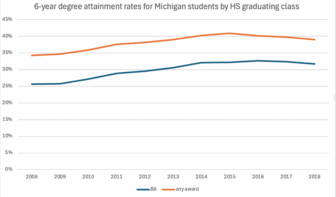At Governor Rick Snyder’s recent Higher Education Summit, George L. Mehaffy, Vice President for ![]() Academic Leadership and Change for the American Association of State Colleges and Universities, offered a dire prediction that made me gasp out loud: Based on the trends since 1980, average state fiscal support for higher education will reach zero by 2059.
Academic Leadership and Change for the American Association of State Colleges and Universities, offered a dire prediction that made me gasp out loud: Based on the trends since 1980, average state fiscal support for higher education will reach zero by 2059.
As shocked as I was by the prediction, I was equally shocked that everyone in the audience- which was largely composed of elected and appointed board members for Michigan’s 15 public universities – didn’t gasp. Surely the end of a public higher education is a gasp-worthy concern. But something has happened over the past few decades when it comes to funding college. Too often, even ardent supporters of higher education have accepted the idea that de-funding of public universities is inevitable instead of bad policy that can and should be challenged.
It matters because according to a study by the Georgetown University Center on Education and the Workforce, 65 percent of jobs by 2020 will require some post-secondary education or training and 35 percent of those jobs will require a bachelor’s degree. In Michigan Future’s first-ever state policy agenda, we argue with ample evidence that the education-attainment-based income gap is widening, there is no more effective public policy strategy to boost Michigan’s economy than increasing the number of Michiganders who hold four-year degrees.
Ironically, Michigan built one of the nation’s finest higher education systems at a time when our robust manufacturing economy put a comfortable living within the reach of people with limited educational credentials. It’s pretty infuriating that now that economic stability is increasingly dependent on college degree attainment, Lansing lawmakers have largely rejected the idea that expanding access to higher education is a public good.
State funding for higher education in Michigan is woefully inadequate. Public universities largely operate with two main sources of revenue: State funding and tuition. As the state of Michigan has allocated less funding to state universities, tuition rates have increased. Since 2001, state funding for Michigan’s public universities has dropped almost 40% when adjusted for inflation. As my colleague Patrick Cooney has noted, Michigan’s public universities received roughly 60% of their operating budgets from state appropriations in 1985, relying on student tuition for 30%, with the rest coming from other sources. Today, only 20% of university operating budgets come from state support, while 70% comes from student tuition.
This has made college increasingly unaffordable, especially for middle class students whose families make too much to receive Pell grants but are not wealthy enough to pay tuition without loans. Lansing lawmakers have encouraged university boards and leaders to tighten their belts, but after two decades of cost cutting, there is little, if any, fat left to cut.
A budget is a statement of a state’s priorities. This is a moment when Michiganders need to decide whether they think their money is better spent investing in a better-educated workforce or offering another round of tax cuts that have had mediocre returns on job creation. What good is it to use tax cuts to lure companies to and retain companies in Michigan if we don’t have workers who are prepared to fill the jobs they will offer?
So I hope the university board members who attended Governor Snyder’s Higher Education Summit will do more than gasp about the dire potential consequences of our state’s disinvestment in higher education. Many of these leaders are politically connected and I hope they will use their voices in an organized fashion to encourage legislators to boost funding for state universities. Support for higher education is not a partisan matter. It’s about the economic survival of our state.







